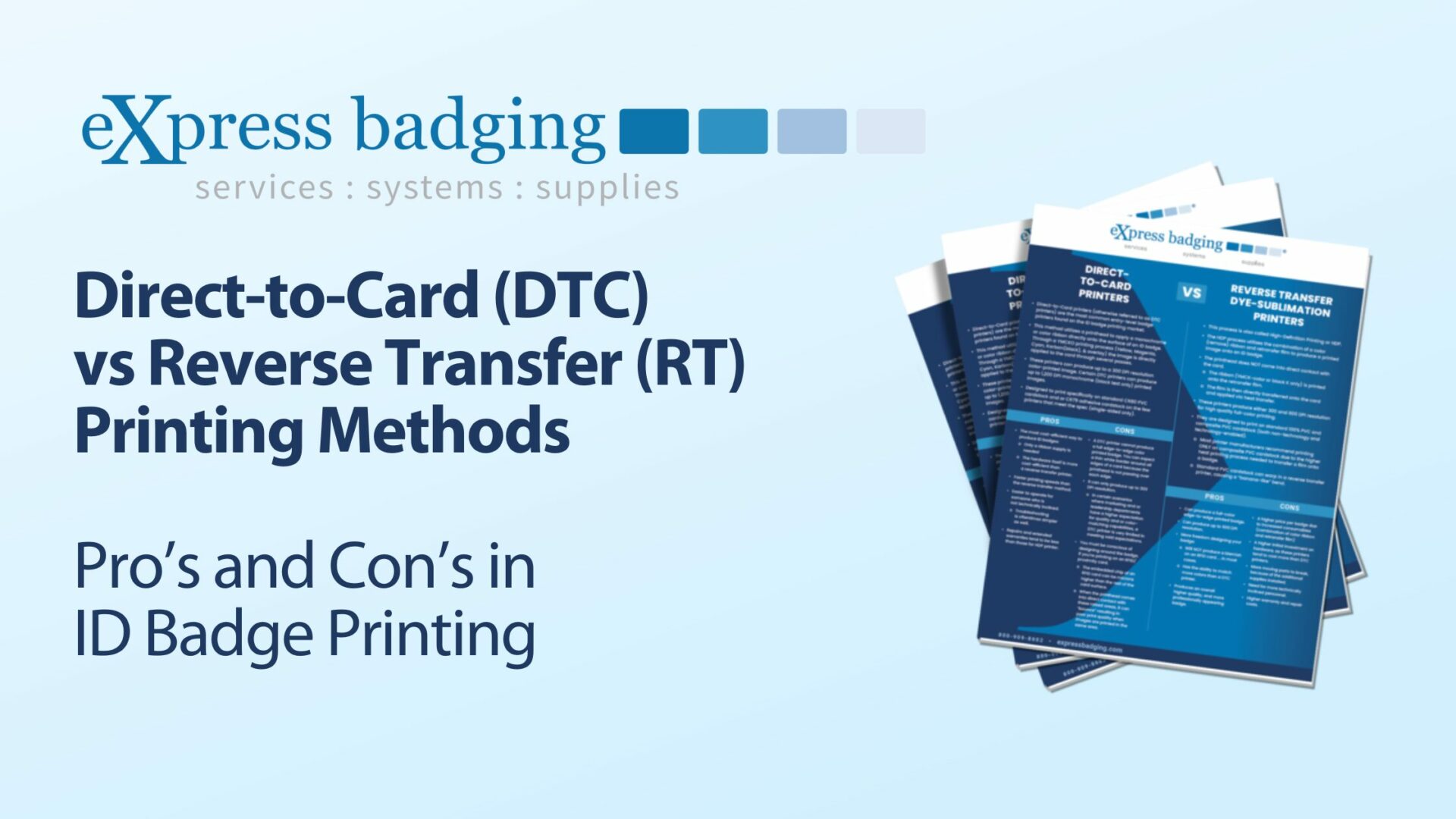When it comes to ID badge printing for many organizations, the choice between Direct-to-Card (DTC) and Reverse Transfer (RT) printing methods becomes a pivotal decision that shapes the efficiency, cost-effectiveness, and overall quality of badge production. In this article, we share the differences and distinct characteristics of each technology, providing an extensive overview of the pros and cons associated with DTC and RT dye-sublimation printers.
Direct-to-Card Printing (DTC): A Comprehensive Overview
Direct-to-Card printers, often regarded as the entry point to badge printing, employ a printhead to apply monochrome or color ribbons directly onto the surface of an ID badge. Utilizing the YMCKO printing process (Yellow, Magenta, Cyan, Karbon (black), & overlay), this method involves multiple passes to achieve the final image. DTC printers typically offer up to 300 DPI resolution for color-printed images, with some models reaching up to 1,200 DPI for monochrome (black text only) prints.
Pros of DTC Printing:
DTC printing methods include several economic and operational benefits. From minimizing expenses with a straightforward ribbon supply to offering faster printing speeds and user-friendly operations, DTC printing is a good choice for organizations seeking cost-effective, efficient, and accessible badge production. The Pros of DTC printing for ID badge printing include:
- Cost-Efficiency: DTC printing proves to be highly cost-effective, requiring only a ribbon supply, minimizing overall expenses.
- Faster Printing: Boasting faster printing speeds compared to RT printers, DTC technology enhances efficiency in badge production.
- User-Friendly Operation: Designed with simplicity in mind, DTC printers are more user-friendly, making them accessible for individuals with varying technical expertise.
- Troubleshooting Simplicity: Troubleshooting is often more straightforward with DTC printers, reducing downtime and enhancing operational efficiency.
- Cost-Effective Repairs: Maintenance costs, including repairs and extended warranties, are generally more affordable compared to their RT counterparts.
Cons of DTC Printing:
In contrast to its strengths, Direct-to-Card (DTC) printing comes with certain limitations that warrant consideration.
- Limited Edge-to-Edge Printing: One notable limitation of DTC printers is their inability to produce full edge-to-edge color-printed badges, resulting in a thin white border around the card.
- Resolution Limitation: DTC printers are constrained to a maximum resolution of 300 DPI, restricting the quality and detail of printed images.
- Design Constraints: Design considerations must account for the thin white border, particularly when printing on RFID/proximity cards.
- RFID Card Challenges: Direct contact with raised areas on RFID cards can lead to compromised print quality, necessitating careful consideration during the design phase.
DTC vs RT – Download our Comparison Chart

Reverse Transfer Printing (RT): Unveiling High-Definition Printing (HDP)
Reverse Transfer, also recognized as High-Definition Printing (HDP), operates using a color ribbon and retransfer film to apply images onto an ID badge. A distinguishing feature of this method is that the printhead does not make direct contact with the card; instead, the ribbon is printed onto the retransfer film, which is then heat-transferred onto the card.
Pros of RT Printing:
The advantages of RT technology extend beyond traditional printing methods, offering organizations an elevated badge printing experience. From its ability to achieve full-color, edge-to-edge prints and high-resolution imaging to providing enhanced design freedom and compatibility with RFID cards, the Pros of this printing method include:
- Edge-to-Edge Printing: One of the significant advantages of RT printing is its capability to produce full-color, edge-to-edge printed badges, eliminating the thin white border present in DTC prints.
- High Resolution: RT printers excel in achieving up to 600 DPI resolution, resulting in exceptionally high-quality, detailed prints.
- Design Freedom: RT printing offers more freedom in badge design, allowing for more intricate and detailed graphics.
- RFID Card Compatibility: RT printing minimizes the risk of blemishing RFID cards, making it a preferred choice when working with technology-enabled badges.
- Enhanced Color Matching: RT printers can match a broader spectrum of colors compared to their DTC counterparts.
- Professional Quality: RT printing delivers a higher quality and more professionally appearing badge, making it an ideal choice for organizations prioritizing a polished image.
Cons of RT Printing:
From a higher cost per badge due to increased consumables to an elevated initial investment in hardware, here is a list of Cons for RT Printing:
- Higher Cost Per Badge: The increased consumption of consumables, including a combination of color ribbon and retransfer film, contributes to a higher cost per badge.
- Higher Initial Investment: The upfront investment in hardware for RT printers tends to be higher compared to the more budget-friendly DTC printers.
- Increased Complexity: RT printers come with more moving parts due to additional supplies, necessitating a higher level of technical expertise during operation and maintenance.
- Warranty and Repair Costs: The enhanced capabilities of RT printers come with a trade-off in higher warranty and repair costs, impacting the overall cost of ownership.
Choosing the Best Option for Your Organization
In navigating the selection process for dye-sublimation printers, organizations find themselves at a crossroads, weighing factors such as budget limitations, specific badge printing requirements, and overarching organizational priorities. DTC printers present a compelling case with their cost-effective and user-friendly features, while RT printers, despite a higher initial investment and increased operational intricacies, shine in delivering top-tier, edge-to-edge print quality.
The key lies in the assessment of your individual needs, ensuring the chosen technology aligns seamlessly with the unique ID badge printing objectives of your organization.
We can Help!
Schedule a FREE 15-minute Discovery Call with an eXpress badging Photo ID Sales Expert.

